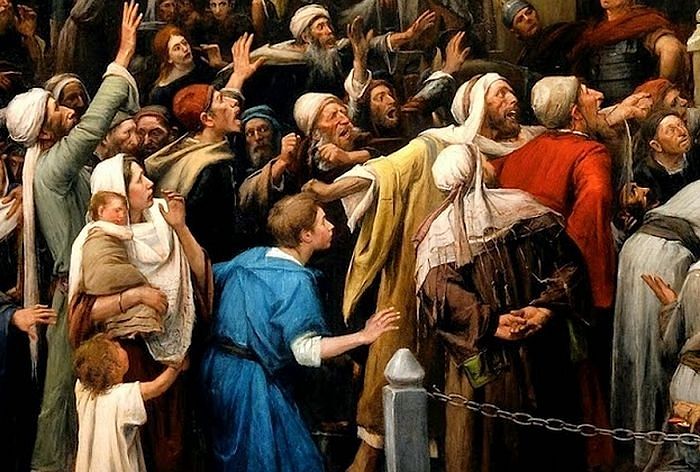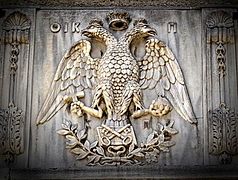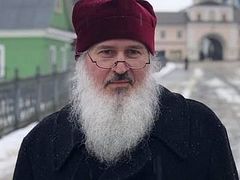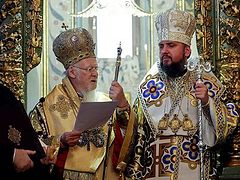
There has been a lot of attention lately on the neo-papism of Constantinople, but in the midst of this it behooves us to beware of falling prey to its partner: populism.
Invariably when one problem starts to become acute, the opposite problem is also exacerbated. Elder Sophrony of Essex has commented that it is a tendency of the fallen mind to take things to extremes and want to move toward impersonal absolutes.1 A dialectic opposition then exists between these absolutes. On a social level this leads to having groups and ideologies in opposition—rich and poor, conservative and liberal, East and West, this country/ethnic group and that one, and all manner of other political, religious, and social divisions one might come up with. On a theological level this fallen mindset also sees things in a relationship of opposition and conflict: Grace and nature, reason and revelation, men and women, clergy and laity, hierarchy and democracy, the list goes on and on. The fallen mind, instead of searching out the subtleties of the natural harmony of our created existence, lives in a simplified and abstracted notion of things. The fallen heart, instead of humbling itself and bearing patiently the passions of others with love, tries to absolutize its own existence at the expense of others. All this creates an ongoing dialectical opposition. However, our Tradition teaches us to walk the Royal Road. We need to understand that it is neither natural, nor Christian, to live in this us vs. them, this vs. that mentality. This division and fragmentation comes from satan and our agreement with his devices—he is working to divide man, just as God is working to unite man.
Our basic theological truth is found in the unity of the Trinity and in Christ as Logos, who has created the world in the image of his own reason and harmony. The natural state of things is a unity, a harmony, of distinctly existing things, wherein there is no opposition. There is only each existing thing reflecting in one degree or another God, the Prototypical Beauty and Harmony. As long as we continue to take a dialectical approach that sees the world in terms of opposing absolutes we will never find this harmony, this Royal Way.
When I speak about papalism and populism I am trying to describe a mindset that disrupts Christ’s harmony and that causes cacaphony and chaos. While the two sides seem to be opposites, really they are simply two sides of the same bad penny. They are the result of each group trying to absolutize their own position instead of trying to find harmony in Christ.
I am extremely saddened when I browse around the internet and consistently see people calling the bishops, and especially the Patriarch of Constantinople, by disdainful nicknames. I cringe when I see some lay people advocating that the Church drop the proper titles for bishops like Your Grace, Your Eminence, or Your All Holiness. This shows a dreadful ignorance of and disrespect for the mystery of ordination. This mindset itself is simply the other side of the same secular/political coin that drives the hierarchy to play politics instead of church. It is the pot calling the kettle black.
Populists will tell you that the primary problem with the church is the abuse of authority by the bishops. This is driven by cultural values that always see the authority as the problem. The papalists, driven by their own autocratic cultural experience, impute into the essence of the Church a certain hierarchical subordinationism2 that existed during the period of the Russian and Ottoman Empires. Thus we see how the tensions that have arisen in our modern world enter into the Church as something alien to her life.
We can hardly avoid some degree of having our image of the Divine Kingdom be a reflection of our own experience. Only the saints have humbled their minds enough to get rid of all human notions in their theologizing. What we can all do, though, is become aware of the tendency and restrain it. All can be watchful and try to avoid promoting their own befuddled perceptions as true theology, all can struggle to be more self-effacing and less driven by ecclesial agendas conceived in passion.
Both papalists and populists are tending to mix Tradition with their cultural experience when creating an apologetic to defend their ecclesiastical position. It is the same approach taken by the Scholastics and which has led the west into such a theological mess. St. Maximos the Confessor notes that there are two types of knowledge that lead us toward divinization. “On the one hand, there is relative knowledge based only on reasoning and concepts, and lacking the actual perception of what is known through experience... On the other hand, there is knowledge that is true and, which is gained only by actual experience—without reasoning and concepts—and provides, by grace through participation, a whole perception of the One who is known.”3 He goes on to note that the first type of knowledge—that of reason and concepts—can motivate one toward the second type of knowledge which is actual participation in and deification in God. The two are to work together to lead us toward God. However, without watchfulness and humility, the natural fallen tendency is to start to combine our fallen perception/experience with the knowledge gained from reasoning and let this replace the search for genuine spiritual perception. Thus we see Anselm creating an idea of the atonement that combines concepts drawn from tradition with his experience of justice drawn from his culture; this is then presented, not as something incomplete and part of a journey toward genuine spiritual perception, but rather as an irrefutable proof and absolutely true.
The Constantinople papalists over the last number of decades have increasingly over-identified the bishop with God. It is almost the opposite of the Latin error. The Latin error is to see the bishop as a man with some special ecclesial power who is a vicar for an absent Christ. This Latin view also tends to be the view the Orthodox populists accept. In response to excessive claims by the Patriarch of Constantinople, and in conformity with populist trends in culture, they feel justified when they treat the bishop as only a man whose authority and person they give no more respect, and sometimes even less, than some political authority figure. This view of the bishop as only a man, naked of his sacramental robe, leads to the cult of personality where it is the personality of the bishop that is looked at—to be praised or denigrated.4
However, our tradition teaches that the bishop is an icon of God and Christ. This is part of the Mystery of Ordination. The Church on earth is set up as an icon of the heavenly kingdom. In our theology the icon does not merely represent, but participates in the prototype. St. Nikodemos of the Holy Mountain reminds us in his “Discourse in Praise of the Archpriesthood”5 that the bishop’s role in this icon is to bear the likeness of God and therefore he must be “exceedingly honored by all those under his care”. The bishop not only represents God, but participates in God and in this is a source of deification for the faithful. It is by virtue of the grace of ordination that we call a bishop by exalted names. Grace, eminence, and all-holiness are all attributes of God. These attributes are part of the sacramental energy of the entire Church; however, the bishop participates in these in a particular way in his iconic role as God in the ecclesial hierarchy. This is why those steeped in Orthodox piety naturally, in love and faith, seek out the bishops blessing as something special. However, we also do not see any particular interest in a patriarch’s blessing over and above the local bishop, nor do we have a Pope that people are flocking to see.
St. Nikodemos borrows from St Dionysius’ “Ecclesiastical Hierarchy” presenting the icon of the Bishop surrounded by the various ranks—priests, deacons, laymen… as an image of God surrounded by the various ranks of angels. Just as God is a source of grace for the angels, so too is the bishop a source of “all graces here below and the living treasure chest of divine gifts which are transmitted to all the ecclesiastical orders”. The bishop is also in the image of Christ being able to forgive sins and in his role as a mediator between man and God. The saint contemplating these realities exclaims,
“Oh what gifts, Oh, the majesty of the archpriesthood! Who now among the faithful cannot see that the archpriest is a living icon of God, and that he brings the likeness of God to the ecclesiastical hiearchy!… I am in wonder and awe, and I do not know at what I should marvel more—the loftiness of the office that has been given to the archpriest or the infinite goodness and philanthropy of God, Who deigned to give such a sublime gift to mortals. This noble dignity is great for it surpasses every other distinction in the world.”6
When we disdain and disrespect the bishops, whether diocesan bishops or patriarchs, we disdain the love of God for his people, and disrespect his gifts. We should not be like political parties who love their own candidates and revile other people’s candidates. There is one episcopacy and we are called to be thankful and see as gifts all those who are ordained equally. If the papists are trying to raise one above the others, the populists are tending to lower some below the others.
This homily by St Nikodemos is worthwhile to meditate on for all of us who have been raised in an egalitarian society, since we tend to have absorbed a built in prejudice against submitting to or honoring anyone as higher than ourselves, and we tend to have a rational and material view of the Church rather than an iconic and sacramental view. I include myself in this since I too fall short.
A lack of Orthodox piety and refined spiritual vision begets a populist tendency to see the authority and holiness of the bishop as dependent on their moral or doctrinal correctness. Populists look only at the activity of the person and fail to recognize the sacrament. We understand that when we look at an icon we are not merely looking at a common picture, but by faith the icon becomes a window to heaven and a source of grace. In the same way, the Orthodox Christian understands that when he sees a bishop he is not merely looking at the person. Rather through the eyes of faith he is called to see the sacramental reality of the ordination, which places the bishop as a participant in, recipient of, and source of a certain iconic grace.
Some populists have accepted the Donatist belief that the sin of the heirarch removes the grace of ordination apart from any actual condemnation by other hierarchs. They believe that laity or clergy can make a decision on their own about whether or not a bishop bears this iconic grace. This is completely contrary to the canons, since by Christ’s will it is the bishops in synod who confer this grace, and only the bishops in synod can remove it. St Dionysius has said, “God is celebrated as justice by distributing what is due to all and by determining the symmetry, beauty, good order, regulation, every apportionment, and the orders for each being…those who rail against the divine justice unknowingly convict themselves of a distinct injustice.”7 Obedience to God’s determined order of things is not optional. It will never bring about good fruit when the laity react to bishops being out of order in a way that in its own turn is also out of order. Disorder cannot beget good order or wholeness. Since when in the Church does God act unilaterally rather than through the very Church and its orders that He has established? We do not believe in any “alones” and are not iconoclasts. Rather we believe that the grace of God dwells in and works through the instruments of His grace. We believe in an embodied activity of God. The Body of God is the Church, and the Mysteries are the energies that move that Body.
The Church is a Mystery, the Body of Christ, and it cannot be undermined simply by virtue of the presence of sin in its leaders. It is a common error in the world to think that getting rid of one set of leaders, or one style of government and replacing these with another is what will bring about a better state of affairs. Our Church teaches us differently. It teaches us that God is in control of history, and it teaches us that to be an Orthodox Christian requires of us to pay attention to our own sins, to work within our own area of responsibility, and leave the rest to God. No one can defeat sin through changing the form of government. An autocracy can be the tyranny of the one, and a democracy can be the tyranny of the many—it is simply sin at work in different ways. The Church, however, as the Body of Christ operates in a Mystery unseen by those without faith whose vision is stuck in material realities. Sin cannot contaminate nor block the Mysteries and their operations. To teach this would be to teach that the energy and operations of man is greater than and can hinder the energy and operations of God. Both the populists who think that they can ordain themselves and those who think that they can anathematize those properly ordained are outside the justice of God and have set themselves up against His ordained order. There is a place for laymen and clergy to speak in this order, but they must also obey the limits God has set for them to act.
If Christ says that what we do to our neighbor reflects back on him (Matt 25:37,45; Matt 10:40-42), how much moreso with a bishop? If failing to treat the common person with respect and care leads to condemnation, how much more will we be judged for the lack of respect and faith toward this or that bishop? Calling certain bishops whom we disagree with or see as problematic by their first names instead of using proper titles, making snide remarks or comments about them—this I think is close to blasphemy. It is a complete failure to recognize the reality of the sacrament of ordination and is a denial and a rejection of the fact that the essence of the Church involves a certain iconic quality as part of her Mystery.
On the other hand, St Nikodemos sees the episcopacy itself as a single mystery that all the bishops participate in. There is no separate rank for being a bishop of bishops. The bishop’s iconic role is in relation to the other orders of the Church, not in relation to an ordering among the bishops themselves. And we know too that there is no subordinationism in God. In the created heirarchy it is natures that are ranked in an order of subordination, while those within each nature are equal. As Elder Sophrony has noted, administrative ranking within the order of bishops is determined by historical circumstances and the needs of our fallen reality, it is not part of the essence of the Church. Likewise, it is a theological error to completely identify the bishop with the Father, or with God, or with Christ, rather than seeing his role as iconic and his relation to Christ as relative and personal, not hypostatic.




As we said before, so say I now again, if any man preach any other gospel unto you than that ye have received, LET HIM BE ACCURSED."
Sister, St. Paul wants to know if he was clear enough.
Why is it OK to say "Jesus did this, Jesus said that..." but,
it is wrong to say "Bartholomew did this, said that"?
Why must we call Bartholomew "Παν-αγιο-τατος" = "All-most-holy" two superlatives,
and simply sing "Holy is God"
Chrysostom says the more titles, the less value.
Chrysostom was called just Archbishop, Bartholomew: Ecumenical Patriarch.
Chrysostom says we must not bend our head to a bishop who wanted to become bishop!
Why does Bartholomew always refers to his "Mother Church" to intimidate others,
whilst we sing "Rejoice Holy Zion,Mother of the Churches" with Bp James the brother of the Lord?